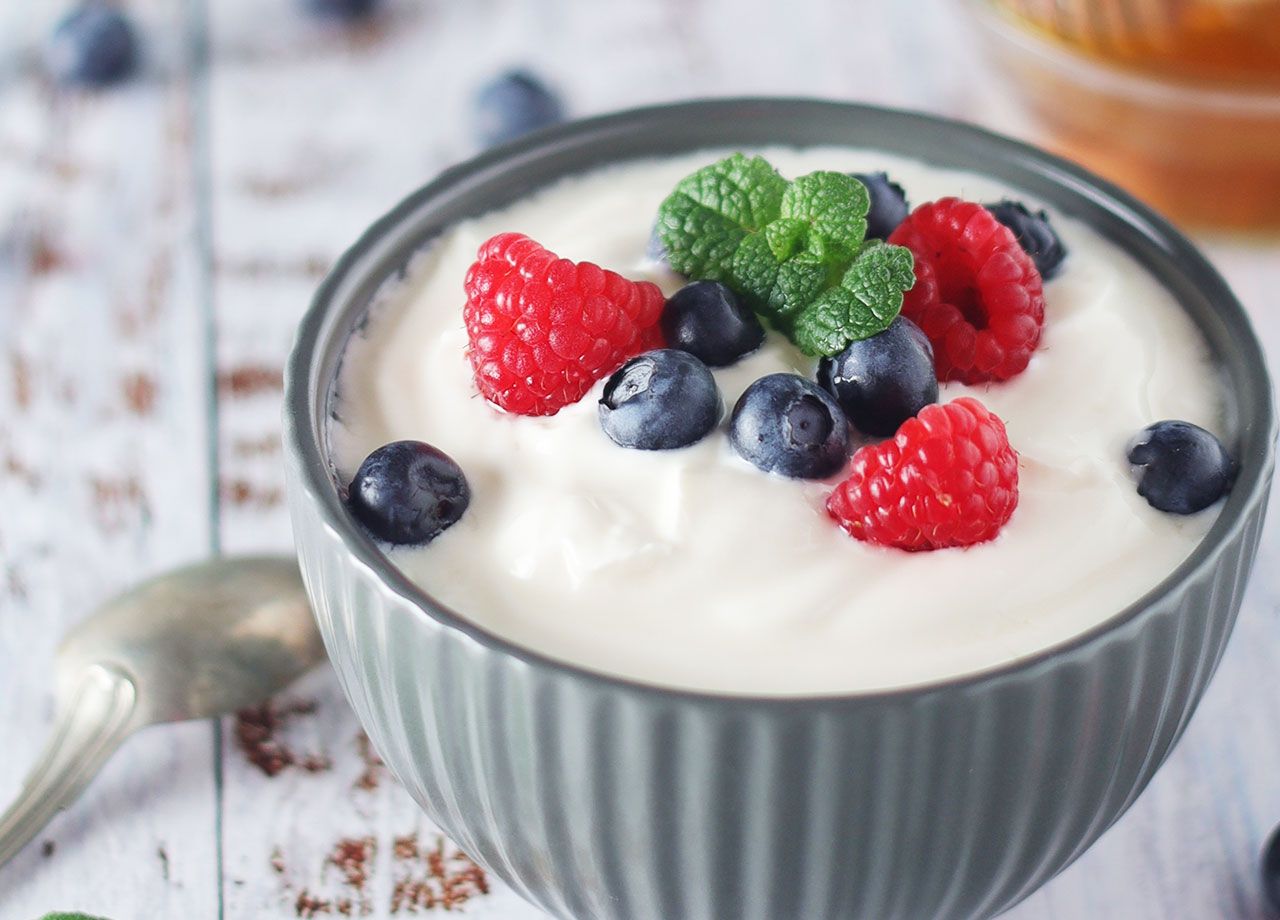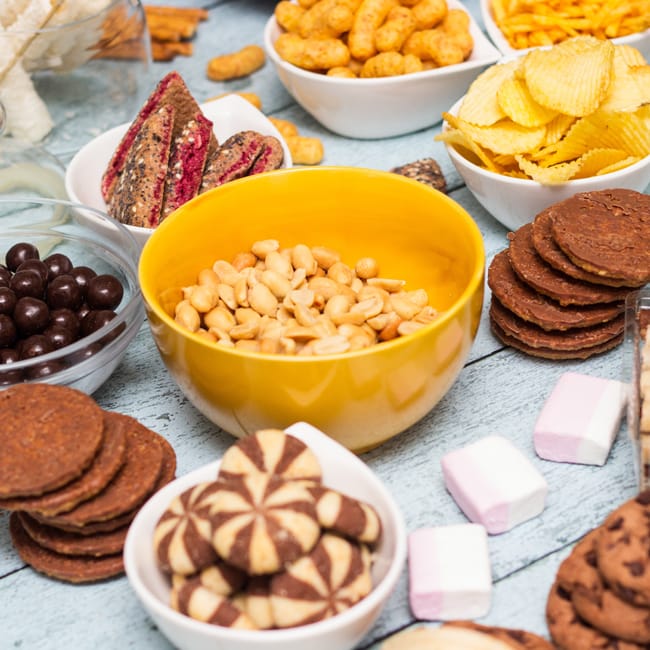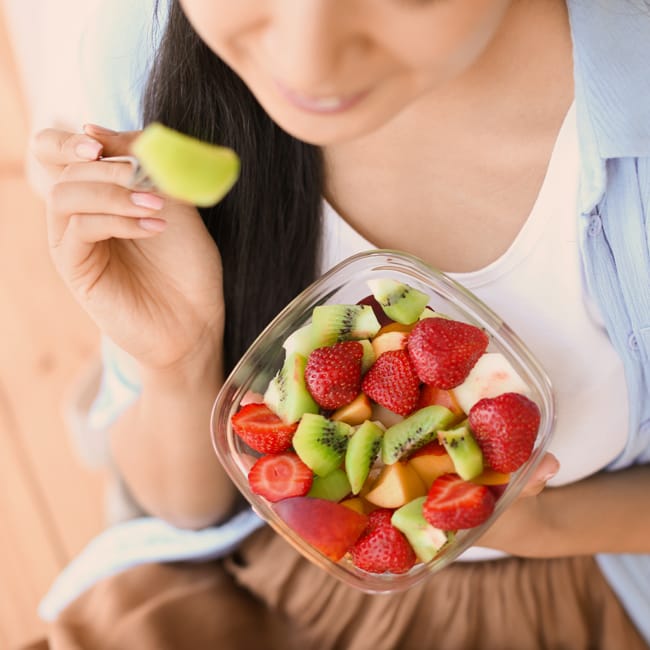Your gut plays a pivotal role in everything from digestion, immune function, metabolism, and even mental health. When the gut is out of balance, you can be susceptible to a wide range of issues such as poor digestion, bloating, extreme tiredness, infections, chronic illness, and more; therefore, it should come as no surprise to hear us – and health experts – say that maintaining a healthy gut is essential to your health and overall well-being!
There are several things you can do every day to help your gut. While getting enough sleep and trying to eliminate stress from your life will inevitably do wonders (easier said than done, are we right?!) incorporating gut-friendly and gut-healing foods into your diet is one of the quickest and easiest ways to do it. Experts recommend limiting your intake of harmful inflammatory, processed foods and swapping them with gut-healing foods that can balance your gut microbiome, give your metabolism a boost, reduce bloating, and aid in digestion. Sounds wonderful!
We spoke to health experts and registered dietitians about some of the best gut-healing foods to incorporate into your diet from today to help reduce bloating and aid with digestion. From fiber-rich fruits and vegetables to fermented foods packed with probiotics, check out 16 of their best recommendations below.


1. Yogurt
Yogurt isn't only a delicious, versatile breakfast food. It also offers up a wide array of health benefits, especially when it comes to your gut. Rich in probiotics like Lactobacillus and Bifidobacterium, this food stands as a cornerstone for a well-balanced gut microbiome. According to registered dietitian Michelle Saari, "Yogurt is essential for a balanced gut microbiome, crucial for digestive and immune health."
Saari highlights the benefits of yogurt for weight loss, noting that the combination of protein and probiotics not only supports digestive health but also contributes to a feeling of fullness, making it a valuable addition to a weight-loss-focused diet. "A typical serving, providing about 12 grams of protein, aids in satiety, reducing overall calorie intake, beneficial for weight loss," she says.
Furthermore, Saari points out that the calcium and protein content in yogurt can boost thermogenesis and fat metabolism. This means that incorporating yogurt into your diet could potentially lead to your body burning more calories, aiding weight loss.

2. Salmon
Fish, anyone? As far as protein goes, it's hard to find a better option than salmon. This tasty fish is rich in omega-3 fatty acids, particularly EPA and DHA, which Saari explains can "reduce gut inflammation, promoting overall gut health." The anti-inflammatory properties of omega-3s contribute to a balanced gut environment.
As a high-protein food, with approximately 22 grams per 3-ounce serving, salmon also plays a role in increasing metabolic rate and reducing appetite. "The omega-3s in salmon also influence genes related to metabolic processes, potentially enhancing the body's fat-burning ability," Saari tells us. And if these benefits weren't enough to convince you to cook some salmon up this week, consider the fact that it's also great for your heart—and your hair, skin, and nails. Incredible!

3. Almonds
Go nuts for nuts! Almonds, in particular, make one of the healthiest snacks out there. They're perfect for weight loss and gut health. With an impressive nutritional profile, almonds are undoubtedly a top choice for gut health and weight management. "With about 3.5 grams of fiber per ounce, almonds support digestive health and regular bowel movements, contributing to a healthier gut," Saari explains.
Plus, the combination of fiber and protein makes almonds a perfect food to keep you satisfied and full throughout the day. Additionally, the monounsaturated fats and omega-6 fatty acids in almonds play a role in metabolic regulation, while the magnesium content is vital for energy production—and could even help you sleep better. What's not to love?

4. Leafy Greens
Leafy greens are some of the most praised veggies in the health world. And that's for a good reason! Options like spinach and kale are nutritional powerhouses, and they're particularly good for your gut and your weight loss efforts. "High in insoluble fiber, leafy greens like spinach and kale promote regular bowel movements and a healthy gut," Saari says.
These greens are not only low in calories but also packed with essential vitamins A, C, and K, making them ideal for a nutrient-dense, weight-loss-friendly diet. Their high iron content is another major plus. Saari notes that it's "crucial for oxygen transport in the blood, essential for efficient metabolism and energy production." Overall, including spinach and kale in your diet can thus support both gut health and overall metabolic efficiency.

5. Kefir
If you haven't explored the world of fermented foods yet, now's your time to start–your gut will love you for it! Fermentation is the process of bacteria and yeast breaking sugar down into carbon dioxide and ethanol, and kefir is one of the best fermented foods out there!
Nurse Practitioner Sarah Anderson explains that "[fermented] foods are filled with beneficial healthy gut bacteria that support a healthy digestive system" by bringing in beneficial bacteria and pushing out the bad bacteria. They also have anti-inflammatory properties, making them a fantastic choice for your overall health.
Kefir is fermented yogurt that has been known to support the immune system and even reduce the severity of lactose intolerance, adds health expert Samantha Cassetty, MS, RD. "One study found that eating six servings of fermented foods, [like kefir], per day led to better microbiome diversity and reduced markers of inflammation," explains Cassetty. "These factors can lower your risk of numerous conditions, including autoimmune conditions, type 2 diabetes, heart disease, and mood disorders like depression and anxiety."

6. Natto Or Tempeh
Both natto and tempeh are examples of fermented soy, making them not only excellent sources of plant-based protein, but also great ingredients to improve your gut health as well.
"Natto is a natural blood thinner," Anderson adds. Natto is often served with rice, making it a filling and gut friendly dish to act as one of your servings of fermented foods throughout the day, and tempeh can be complementary to a number of stir fry and salad options for a boost of volume.

7. Kimchi
According to registered dietitian Trista Best of Balance One, fermented food like kimchi also improves your gut health and overall digestive system.
"The process of fermentation requires many good bacteria and they are retained in the food once the process has ended," she explains. Eating fermented food such as kimchi allows you to restore the balance of good bacteria in your gut which in return helps strengthen it.

8. Sauerkraut
Sauerkraut, otherwise known as fermented cabbage, is one of the easiest options to integrate into your diet as a side to meals that will improve your gut health and allow you to feel great in your body.
"Fermented chopped cabbage lowers blood pressure and protects blood vessels," notes Anderson. Low in calories and rich in probiotics, this German classic is wonderful for lowering your risk of disease while providing a slew of benefits to your digestive health.

9. Kombucha
Kombucha is packed with probiotics and great flavor to improve your gut health, boost your immune system, and even provide your body with natural energy to replace coffee or soda.
"In addition to [probiotics and polyphenol antioxidants] and the impact of eating and drinking fermented foods on your gut microbes, kombucha has antibiotic and anti-inflammatory properties," explains Cassetty. That said, looking for a kombucha option that is low in added sugar will ultimately be the most beneficial for your body as artificial sweeteners have been known to be one of the leading causes of weight gain and digestive issues.

10. Miso
Miso is one great fermented ingredient that works fantastically in a number of recipes. Lisa Richards, CNC, cites miso soup as one delicious option.
"Miso soup is considered good for gut health due to its key ingredient, miso, which is a fermented soybean paste," she explains. "Miso is rich in live enzymes that aid in breaking down food, easing the burden on the digestive system. Moreover, miso contains prebiotics, which are non-digestible fibers that nourish beneficial gut bacteria."
Richards points out that "miso soup's gentle warmth and easily digestible nature make it a soothing choice for those with sensitive digestive systems, further contributing to gut comfort and overall well-being." Perfect!

11. Berries, Such As Raspberries, Blackberries, Strawberries
There are so many benefits to eating berries on a regular basis. Integrative Nutrition Health Coach Solveig Eitungjerde explains that these small fruits are high in insoluble fiber, which aids bowel movements and feeds beneficial gut bacteria. Their high antioxidant content also contributes to overall health.
"Add to yogurt, cereal, or eat as a snack," she recommends. Berries provide a sweet and nutritious addition to your meals, easily enhancing your daily fiber intake.

12. Legumes, Such As Lentils, Chickpeas, Beans
Legumes are an excellent source not only of plant-based protein, but also of both soluble and insoluble fiber, promoting regular bowel movements and feeding gut bacteria. "Add to salads, soups, or use as a base for veggie burgers," Eitungjerde advises. Legumes can be incorporated into a wide range of dishes, making them a versatile and nutritious option for increasing fiber intake.
Lentils make a fantastic source of plant-based protein—but they're also rich in fiber. In fact, RDN Alanna Kate Derrick, sports nutrition coach, says they're one of her "top fiber picks," and for good reason. "These nutrition powerhouses pack around 16g of fiber per cooked cup!" she exclaims. "The combination of protein and fiber makes lentils an incredibly satiating addition to salads, soups, and grain bowls. Simply rinse them, then toss into your dishes for an instant nutrient boost." Yum!

13. Chia Seeds
Whether you're whipping up chia seed pudding, sprinkling chia seeds into your oatmeal, or working these small but mighty superfoods into any number of other recipes, you can't go wrong with these guys.
"Chia seeds are rich in soluble fiber," Dr. Mrinal Pandit, a registered dietitian, clinical nutritionist, and certified nutritional counsellor, explains. "When consumed, they absorb water and form a gel-like substance in the digestive tract, promoting feelings of fullness and helping with digestion." She notes that they can even help with blood sugar regulation and hydration, both of which can help with weight loss and bloat prevention.
"Add chia seeds to smoothies, yogurt, or oatmeal to boost fiber and omega-3 fatty acids," she suggests. Or, "Make chia pudding by soaking chia seeds in almond milk or coconut water overnight and topping with fruit and nuts for a satisfying breakfast or snack." Yum!

14. Avocados
Like many items on this list, avocados contain both soluble and insoluble fiber, supporting overall digestive health. They are also rich in healthy monounsaturated fats, which are beneficial for heart health.
"Use as a spread on toast, add to salads, or blend into smoothies," Eitungjerde suggests. The creamy texture of avocados makes them a delicious and versatile ingredient in many dishes.

15. Artichokes
Don't sleep on the power of artichokes! According Derrick: "Artichokes are another all-star bloat-buster, providing around 10g of fiber per medium artichoke." Not bad at all! She notes that "the specific type of fiber artichokes contain actually feeds the good bacteria in your gut, improving overall digestion."
If you're looking to fit more artichoke into your diet, she recommends grilling artichoke hearts or enjoying steamed artichoke leaves dipped in zesty yogurt-based sauce. Sounds delicious!

16. Oats
Oats are packed with benefits, especially when it comes to digestive health. They're rich in beta-glucan fiber, a type of soluble fiber that supports gut bacteria and helps reduce cholesterol levels. This fiber forms a gel-like substance in the gut, which can aid in maintaining healthy blood sugar levels and enhance feelings of fullness.
"Enjoy as oatmeal for breakfast, add to smoothies, or use in baking," Eitungjerde suggests. Incorporating oats into your diet is easy and versatile, making it a simple way to boost your fiber intake.


























